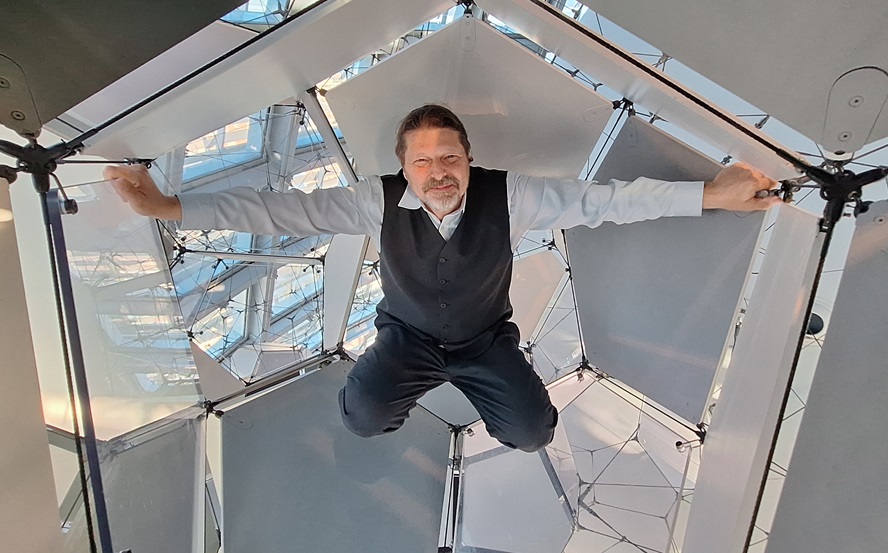- HumanitiesLiterature
- 26 de March de 2025
- No Comment
- 12 minutes read
David Rabadà: “We Are Facing an Orwellian ‘1984’-Style Scam”

Interview with David Rabadà, Writer and Geologist
David Rabadà: “We Are Facing an ‘1984’-Style Scam”


Eva Serra
A new title has recently hit the shelves, adding fuel to the ever-burning debate on education: La educación basurizada. El cáncer de las pseudociencias en educación (Trash Education: The Cancer of Pseudosciences in Education, Dobleuve) by David Rabadà i Vives. Perhaps owing to his scientific background, Rabadà remains resolute in exposing what he calls ‘pedagogism’ as lacking empirical support. He argues that a solid education hinges on the transmission of knowledge—relying on teaching methods as unfashionable as direct instruction and memorisation.
A palaeontologist and science communicator, Rabadà earned his PhD in Geological Sciences from the University of Barcelona in 1995. He has worked on various research projects at the CSIC (Spanish National Research Council) and has received multiple literary awards. Currently, he is a lecturer in Geological Sciences and a member of the Acadèmia de Ciències Veterinàries de Catalunya. He also serves as Head of Communications for the Professors de Secundària union (aspepc·sps) and as Chief Science Editor for Educational EVIDENCE.

You write that “Teaching is different from educating” and that their objectives are distinct. Is there any correlation between the two? In other words, does greater instruction necessarily lead to a more educated individual?
Not necessarily. One may acquire extensive knowledge through instruction yet remain entirely ignorant in terms of education. However, while not everyone who educates is educated, those who are truly educated always educate others.
You argue that the teacher, not the student, should be the focal point in the classroom, and you criticise pedagogies that advocate for teacher-student equality. Why do you believe these approaches are misguided?
In my book, I outline how such perspectives stem from prejudice and vested interests rather than logical or scientific reasoning. Science does not reveal absolute truth; rather, it brings us closer to it by relying on empirical data, formulating predictions, and rigorously testing them. Pedagogism, on the other hand, is driven by belief—it claims to possess the truth without empirical evidence, predictive capacity, or verification. Moreover, one must examine who funds pedagogism: banks, economic institutions, corporations, and foundations. This financial backing exposes a web of prejudices and interests that fuel its propagation. The educational debate has been hijacked by the stupidity and malice of some, devoid of robust evidence or genuine knowledge.
“When past civilisations invented writing, none concluded that humans should no longer memorise”. (p. 86) Why this crusade against memorisation?
Without a solid foundation of knowledge in any given discipline, it is impossible to cultivate creativity, problem-solving skills, critical thinking, and reading comprehension—the very principles that pedagogism paradoxically claims to champion. In this sense, memorisation is indispensable. Pedagogists dismiss it yet fail to demonstrate that their alternative produces more enduring learning. When confronted with facts that challenge their beliefs, they often prefer to adjust their interpretations by denying the evidence—precisely what pedagogism does.
There is a recurring paradox: sometimes we assume that the majority must be right; other times, we assume our own beliefs are widely shared. Both lead pedagogism into error, prioritising a superficial and playful approach to teaching over one that is rigorous and effective. Many believe that enjoyable and rapid learning equates to quality and retention, yet what is easily learned is easily forgotten. Good teaching, like proper digestion, takes time. To those who claim that learning should not involve memorisation, I would simply say this: everything we learn, we learn through memory. Without memory, there is no learning; without knowledge, memory cannot improve.
«Everything we learn, we learn through memory. Without memory, there is no learning; without knowledge, memory cannot improve»
You argue that instruction has been sidelined in favour of a social-assistance model in schools. Is the purpose of knowledge being distorted?
Absolutely. The transmission of knowledge in our educational institutions is being eroded by being confused with emotional education, values, and competencies. But without solid, durable knowledge being taught and internalised, neither sound emotions, values, nor skills can truly develop. At best, we risk regressing to a pre-human, irrational state—hardly advisable given our history. Mistakes cannot be avoided without knowledge. If schools abandon knowledge, they abandon future progress. Moreover, knowledge cannot be acquired without prior knowledge of the subject at hand. Expecting otherwise would be like trying to learn to swim in thin air.
In your book, you explain how the concept of knowledge was deliberately omitted from the definition of competencies and mistranslated as skill, fundamentally altering its meaning. What do you think lies behind this mistranslation?
I attribute it to the intentions shaped by the prejudices of the dull-witted and the interests of the rogues. More importantly, how can one be competent in something without possessing knowledge about it? Can effective teaching occur if students fail to acquire lasting and meaningful knowledge? Competence in any field means applying what one knows in a durable manner to solve specific problems. Without knowledge, there is no competence.
«Competence in any field means applying what one knows in a durable manner to solve specific problems. Without knowledge, there is no competence»
You also criticise the use of innovation, arguing that it is often nothing more than the destruction of previous models, echoing Foucault’s pedagogical legacy. Are we witnessing a semantic distortion within academia?
Innovation for its own sake does not mean improving; it is a tautology. What we are facing is an Orwellian scam, straight out of 1984. Big Brother rewrites the educational past, dictates the pedagogical present, and robs the future of real teaching. Take the so-called competency-based model: marketed today as a groundbreaking innovation, it was already in use during the Palaeolithic era and later rebranded by the Nazis to optimise their war machine. Now, pedagogists sell it as the latest educational breakthrough.
The real objective should not be innovation, but improvement. We must seek effective methods wherever they may be found—whether in cutting-edge advancements or in tried-and-tested approaches from the past. And yet, year after year, education is flooded with new “innovations”, each promising to make learning easier and more effective. Decades later, education has only become more convoluted and less effective. Who will break it to the romantic pedagogists that the Holy Grail does not exist? Next, they’ll be bringing up the Three Wise Men.
Emotional education and ideology—what can you say about this pairing?
Pedagogism promotes an ideology without being pedagogy—much like environmentalism pretending without being ecology. Socialism, Barcelonism, or Nazism are ideologies rooted in belief rather than in “logies” derived from scientific inquiry. This is why, in education, well-connected prior knowledge is far more valuable than poorly substantiated emotional pedagogies. The former operates within the realm of biological cognition; the latter, within the realm of illogical ideologies. Pedagogical gurus who advocate for content-free innovation are, in essence, the hired assassins of an education stripped of knowledge.
Education without exams or homework—is this the surest path to academic failure?
It is certainly one of the quickest. Yet, it is also one of the most seductive, easily convincing parents, students, and even teachers. Who wouldn’t be tempted by the idea of spontaneous, project-based learning—free of homework, exams, memorisation, subjects, and failing grades? Families are unlikely to resist, but those who defend the transmission of critical knowledge will inevitably clash with this glorification of ignorance.
«Universal Design for Learning, or UDL, is a fraud built on disproven theories like multiple intelligences and learning styles»
From your scientific perspective, you also criticise pedagogical models such as UDL (Universal Design for Learning). In what fundamental ways does this strategy contradict scientific evidence?
Universal Design for Learning, or UDL, is a fraud built on disproven theories like multiple intelligences and learning styles. This so-called educational strategy claims that representation, action, and motivation are housed in distinct areas of the brain. Yet, despite my efforts, I have not found a single scientific study to support such a mental framework—are they pulling my leg?
If students truly differed in their personal learning styles (as UDL suggests), then oral, written, and visual exams should yield significantly different results for each student. Yet, in reality, the results are quite similar. We know that every brain is unique, but we also know that the most effective way to learn is the same for everyone: active learning. It is one thing to claim that some individuals find learning easier than others; it is quite another to believe that each person learns in a fundamentally different way. The way our brain learns is universal within our species, just as the way we listen, observe, smell, or taste is. Before the age of twelve, I studied with music, believing, as UDL asserts, that it was the best way for me to learn—until I discovered that in silence, I was achieving record-breaking grades. In other words, I confused what I liked with what actually worked.
The final section of your book is dedicated to presenting positive proposals, solutions in the form of a decalogue. Which do you consider the most urgent?
The most urgent step is to eradicate the notion that students can learn independently, without the guidance of an expert teacher specialised in the subject matter. Doing so would dismantle almost the entire pedagogical ideology, along with its project-based learning, competency-based education, interdisciplinary approaches, UDL, and other fallacies that fail to provide students with lasting knowledge. Moreover, by taking this approach, we reinforce both innovative and traditional teaching techniques that genuinely foster durable learning. The book outlines these methods one by one.
Your book’s subtitle refers to “The Cancer of Pseudosciences in Education.” Continuing the metaphor, is it with or without metastasis?
With.
Source: educational EVIDENCE
Rights: Creative Commons

